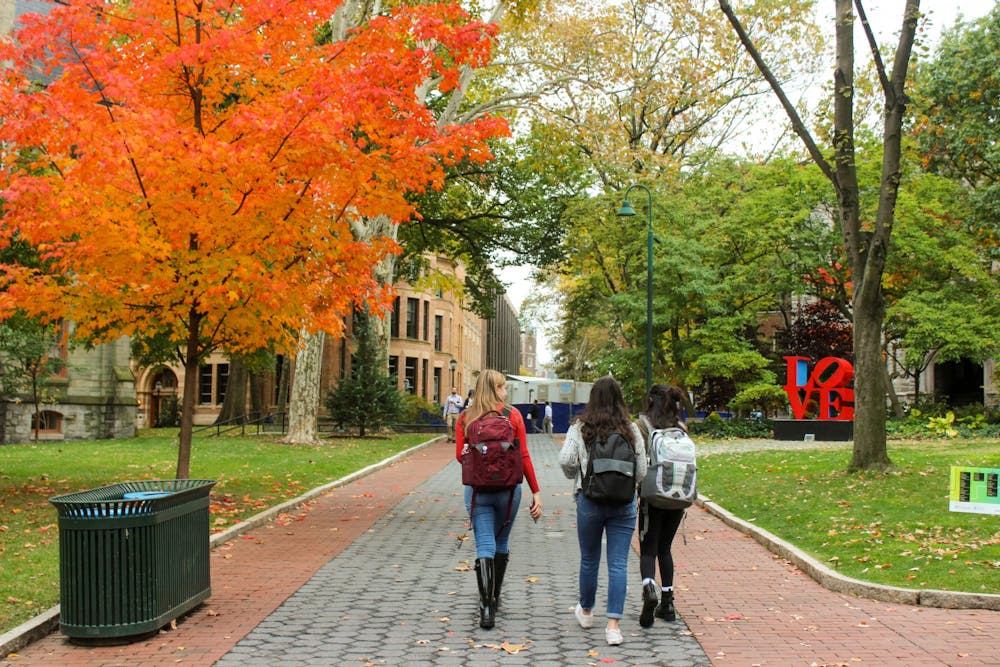
1. Don’t wait until you’re graduating to appreciate the people and resources in college.
There’s a culture of bashing Penn and trying to outcompete other Penn students, both academically and socially. As a result of this crisis, many Penn students have been demonstrating efforts to support other students, challenge the grading system, and hold Penn accountable for its actions. The state of panic resulting from COVID-19 health measures has shown us that when push comes to shove, we must find unity and comfort in each other more than ever before.
As hectic as things may be, a resounding conclusion that many Penn students have come to is to not take life for granted. Treasure your time at Penn. Don’t wait until you’re graduating before realizing how important and transformative college has been. Consider ways to improve and maintain your relationships now rather than later. The weight of your words will not burden you as deeply when you actually follow through with your otherwise unmet promises of “grabbing lunch together” or “catching up next time.”
2. College professors, show that you care.
With classes transitioning online, the relationship between students and professors has never been more unclear. Professors should factor in how students’ personal lives will affect their academic performance. There are less callous ways to show students you care about everyone’s well-being than an emotionless Canvas update. Showing some humanity and leniency to your students will not diminish the respect they have for you, rather, it may actually increase their trust and appreciation for you. It’s not enough to simply offer regular office hours and expect vulnerable students to play catch up as needed.
Be mindful how social factors affect students' health. Some students do not have suitable home environments due to various reasons, i.e., toxic families or inadequate access to the internet. For these students, Penn was a sanctuary that provided security and housing. Being forced to move out and possibly even returning to toxic environments removes that protection, making learning even more difficult. College is not the equalizer for social class, it is a place where those with sharp learning curves profoundly struggle with imposter syndrome simply to stay in the game.
3. There’s a class divide in everything we do, as demonstrated by the move out dilemma.
Moving out is understandably a stressful time for all students, but the initial four day eviction caused a panic that revealed distinct class divides at Penn. This point is not meant to bash first-world problems, but rather to validate them without losing sight of bigger picture issues. Instead of feeling guilty or minimizing your own struggles, find solidarity in empathizing with others’ struggles and search for ways you can offer them support. When you are feeling incomplete or distraught, help make someone a little bit more whole by using the resources you are fortunate to have.
Not all students have the same level of parental help or alternative options outside of campus housing, which Penn was grossly unprepared for when they evicted hundreds of students, all of whom had very valid reasons to stay. The university must consider how it can provide support for FGLI students in efforts to move out not only in times of crises, but in all future years to come.
Never again should there be mistreatment or utter disregard for vulnerable students like there was today.
4. Politics at Penn never started solely with Trump's election, and it doesn’t end there.
The silver lining in crises like these is that the aftermath can finally open people’s eyes and mobilize efforts. Regardless of the 2020 presidential election's outcome — racism, sexism, and classism doesn’t end with the Trump administration. For better or worse, Trump has changed the national dialogue on many societal issues. Penn students are implicated in this because we not only need to determine how involved we are with politics, but also understand how we are involved in perpetuating cycles of inequality. I hope Asian-Americans in particular will see the heightened rates of attacks and xenophobia and respond by not only increasing our political engagement, but also our empathy for other minorities — for whom this level of hatred is a daily lived reality.
The impact of COVID-19 is bigger than us. It’s bigger than Penn. We must all play our part in combating misinformation spread in the media and various platforms. We must all do our due diligence in breaking down wealth inequality in the institutions we will work for in the future. Resources like healthcare and education should and can be reframed as a public good, rather than a luxury.
And just as Penn students have mobilized to create resource guides and share mutual aid, never forget the importance of nonprofits and grassroots work in the broader sense of society. Paramount efforts by various companies to provide access to internet, food, etc. have shown that help for the greater good is indeed possible. In this time of distress, let’s find solace in knowing that there are still good people out there and remember that there is more work to be done in the future. Until then, rest for better days to come.
TON NGUYEN is a college senior from Atlanta, Ga. studying Politics, Philosophy, and Economics. Her email address is nton@sas.upenn.edu
The Daily Pennsylvanian is an independent, student-run newspaper. Please consider making a donation to support the coverage that shapes the University. Your generosity ensures a future of strong journalism at Penn.
Donate







